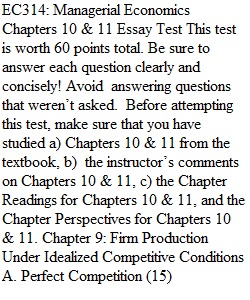


Q EC314: Managerial Economics Chapters 10 & 11 Essay Test This test is worth 60 points total. Be sure to answer each question clearly and concisely! Avoid answering questions that weren’t asked. Before attempting this test, make sure that you have studied a) Chapters 10 & 11 from the textbook, b) the instructor’s comments on Chapters 10 & 11, c) the Chapter Readings for Chapters 10 & 11, and the Chapter Perspectives for Chapters 10 & 11. Chapter 9: Firm Production Under Idealized Competitive Conditions A. Perfect Competition (15) 1. What is unique about perfect competition as a market structure that sets it apart from the other three market structures we cover in this course? How does it affect the diagrams that we use to analyze firm behavior? (4) 2. What are the implications of the assumption of easy entry and exit for the results of perfect competition in the long-run? (4) 3. In what two ways is the market structure known as perfect competition said to be “efficient” so that we use it as a benchmark against which to measure the results of the other market structures? I have suggested that an additional assumption is required for one of those measures of efficiency to hold – what is it? (7) B. The Value of Teams (15) “Teams, schmeams!” gripes your boss. “We have 100 workers making sleeping bags. Our costs are determined by the prices we pay for supplies and workers, and there’s not much else we can do.” Explain to your boss why team production may be important for the firm and offer a suggestion for how large the teams should be and on how team members should be paid. Chapter 10: Monopoly Power and Firm Pricing Conditions A. Some economists argue strongly that monopoly (or monopoly power) is a huge problem for the economy, and that the government needs to take vigorous action to eliminate or control monopoly (through the use of anti-trust laws or regulation). Other economists seem to believe that monopoly really isn’t a problem that we need to worry about that much. (20) 1. Why do some economists worry so much about monopoly –in what ways do they believe that monopoly is inferior to perfect competition? 2. What is it that convinces other economists that monopoly actually isn’t all that much of a problem? (Here are some questions that might be worth thinking about: What is the source of the monopoly? What are the effects of regulation or vigorous antitrust enforcement as compared to leaving the market alone? Are we talking about the short-run or the long-run?) B. Wow, can you believe it? This company will match the best price offered by any of its competitors. They sure do have their customers’ best interests in mind,” says Cindy Consumer. Explain to Cindy why the economist thinks her viewpoint is naïve (since businesses always seek to maximize profits!) What are some other examples of behavior by firms that look like they are there to give consumers a great deal but are actually designed to increase firm profits?(10)
View Related Questions